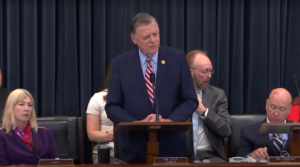House Agriculture Chair G.T. Thompson has tentatively scheduled a farm bill markup for the week of Feb. 23, according to three people familiar with the plans.
Senate, House Committees Advance Ag-FDA Spending Bills
Axios’ Victoria Knight reported Thursday that “the Senate Appropriations Committee approved the Agriculture-FDA spending bill 27-0 Thursday.”
“Both chambers of Congress have now approved their FY25 Ag-FDA funding bills out of the full committees,” Knight reported. “The bill was approved with little debate on the Senate side, with senators approving the bill and the accompanying manager’s amendment quickly.”
The House Bill
Bloomberg Law’s Skye Witley reported Thursday that “House appropriators advanced a spending bill Wednesday that would cut the Agriculture Department’s budget by $308 million if enacted in its current form. The Agriculture-FDA spending bill would allocate $22 billion for USDA in the 2025 fiscal year. The legislation also provides $6.8 billion for the Food and Drug Administration.”
“The legislative proposal was approved 29-26 by House Appropriations Committee members, and is slated for House floor consideration the week of July 22,” Witley reported. “In total, the bill allots $25.9 billion for the USDA, FDA, and related agencies including the Commodity Futures Trading Commission.”

The most significant change that took place during debate was the approval of “an amendment offered by Rep. Sanford Bishop, D-Ga., ranking member on the House Agriculture Appropriations Subcommittee, to strike a provision included by Rep. Andy Harris, R-Md., that would have created a Supplemental Nutrition Assistance Program pilot project to allow the purchase of only “nutrient dense” foods,” The Hagstrom Report’s Jerry Hagstrom reported. “…Last year, Harris’ SNAP proposal was considered a reason the House had difficulties passing an agriculture appropriations bill.”
Hagstrom reported that “the committee also:
- Added a provision for the Special Supplemental Nutrition Assistance Program for Women, Infants and Children to address peanut allergies.
- Added a provision to help the Agricultural Marketing Service address the importation of Brazilian molasses through Canada that appears to be entering the country to avoid the tariff that would be placed on sugar cane imports.
- Rejected an amendment (Rep. Barbara Lee, D-Calif.) offered to strike provisions that would forbid agencies under the committee’s jurisdiction to engage in equity programs.
- Rejected an amendment offered by Rep. Debbie Wasserman Schultz, D-Fla., to strike a provision restricting the FDA’s ability to write rules regarding menthol cigarettes.”
“This year’s Ag-FDA bill didn’t include a contentious abortion pill rider that could have caused trouble for moderate Republicans,” Knight reported. “Last year, those moderates helped tank the Ag-FDA bill on the House floor over language that would have reversed FDA rules around dispensing the widely used abortion pill mifepristone via mail and at retail pharmacies.”
The Senate Bill
According to reporting from Agri-Pulse’s Philip Brasher, “spending for USDA and FDA would be increased by 3% in fiscal 2025 under a bill advanced by the Senate Appropriations Committee on Thursday, drawing a sharp contrast with the House GOP version of the measure.”
“The Senate bill notably rejects the House bill’s deep cut in the Food for Peace program that has drawn sharp criticism from Agriculture Secretary Tom Vilsack,” Brasher reported. “The Senate bill is funded at $27.049 billion, which would be an $831 million increase from FY24.”
Brasher reported that “the Senate bill also would provide:
- $965.8 million for conservation operations at USDA’s Natural Resources Conservation Service, up from $914.9 million for FY24.
- $1.87 billion for USDA’s Agricultural Research Service, a $29 million increase from FY24.
- $1.079 billion to the National Institute of Food and Agriculture, up from $1.076 billion in FY24. NIFA funds research at colleges and universities.
- $4 million to the National Agricultural Statistics Service to restore a series of reports cancelled because the agency said it didn’t get enough funding for FY24.
- A $1 million increase over fiscal year 2024 to beef up enforcement of the Packers and Stockyards Act.
- $75 million to the ReConnect grant and loan program for rural broadband. The program, which has a separate stream of funding through the 2021 infrastructure law, was reduced to $90 million in FY24, down from the $348 million the program got in FY23.
- A $22 million increase for FDA.”
Capitol Spending Bill Fails on House Floor
Despite the Senate and House passing a number of appropriations bills out of committee in the past few days, Poltiico’s Cailtin Emma and Jennifer Scholtes reported Thursday that “House Republicans failed to pass their $7 billion funding bill for parts of the legislative branch on Thursday, a surprise misstep in what should have been an easy victory for GOP leaders.”
“The failure is an ominous sign for Republicans’ push to pass the rest of their fiscal 2025 spending bills on the floor before August recess, with seven bills — most of which are far more politically divisive — tentatively slated for floor action during the last two weeks of July,” they reported.





